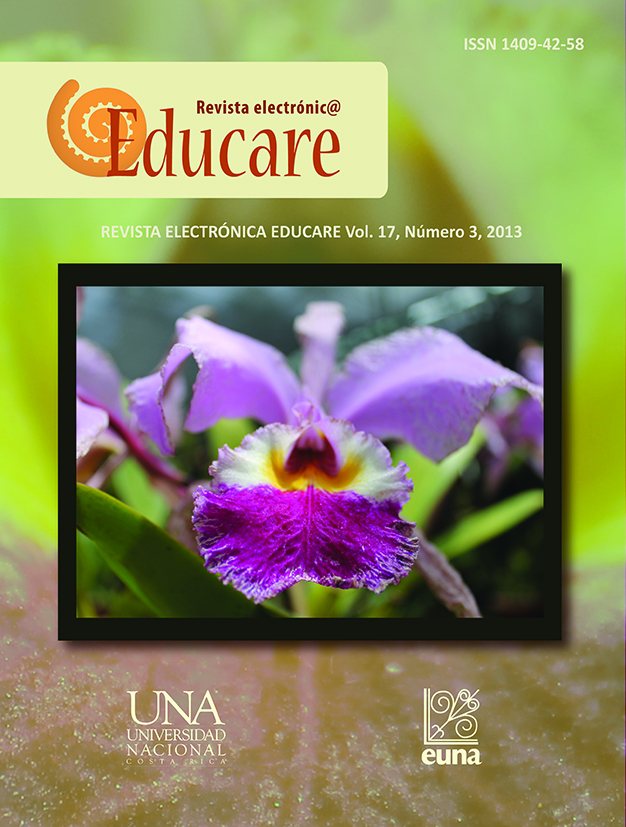Coordinators’ Perspective on the Pedagogical Intervention in the Study Program “Pedagogy with a specialization in the 1st to 6th grades of the Basic General Education”
DOI:
https://doi.org/10.15359/ree.17-3.15Keywords:
Pedagogical intervention process, pedagogical praxis, students, coordination, teachers.Abstract
This scientific paper is the result of the pedagogical intervention process carried out as part of teacher training in the study programs of the Basic Education Division at Universidad Nacional (Costa Rica). It aims at bringing into focus the tasks of the supervised professional practice process conducted in the study program of “Pedagogy with a specialization in the 1st to 6th grades of the Basic General Education”, from the perspective of the coordinators of this process. The coordination tasks that are essential for the development and successful completion of the professional practice process are analyzed and systematized in three main areas: coordination, induction, and conclusion of the pedagogical intervention tasks. The opinions of students and faculty members are considered in the evaluation. One of the main contributions of this paper is calling attention to the pedagogical intervention process, which involves not only the joint preparation of a course program, but also a number of coordination strategies among the persons in charge of the pedagogical intervention to complete the process and take advantage of the practice to think carefully on the educational reality. This study has been also an opportunity of analysis and teamwork focused on continuous feedback to students and to the process itself, giving a new shape to the professional practice, and strengthening university training where the pedagogical intervention process of the Basic Education Division is a permanent research platform.
References
Aebli, H., Colussi, G. y Sanjurjo, L. (1998). Fundamentos psicológicos de una didáctica operativa. El aprendizaje significativo y la enseñanza de los contenidos escolares. Rosario: Homo Sapiens.
Bejarano, S., Dobles, C., León, H, Quesada, E., Rojas, D. y Vásquez, E. (2008). Políticas y lineamientos que orientan el desarrollo y ejecución de la intervención pedagógica desde los cursos. Heredia, Costa Rica: División de Educación Básica. Material inédito.
Bejarano, S., Flores, L., Herrera, A., Jiménez, R. y León, H. (2010). Plan de estudios de la carrera de licenciatura de pedagogía en I y II ciclos de la educación general básica. Heredia, Costa Rica: División de Educación Básica.Material inédito.
Camacho, M., Castillo, R., León, H., Miranda, A., Pereira, Z. y Vásquez, E. (2012). Disposiciones generales para la intervención pedagógica. Heredia, Costa Rica: División de Educación Básica. Material inédito.
Camacho y Rojas. (2010). Programa del curso DB-1212 Construcción pedagógica desde el aula escolar. (Diplomado en Pedagogía con enfasis en I y II ciclo de la Educación General Básica). Universidd Nacional. Centro de Investigación y Docencia en Educación. División de Educación Básica. Heredia, Costa Rica.
Rojas, K. y Segura, S. (2009). Informe de la Intervención pedagógica 2009. Heredia, Costa Rica: División de Educación Básica. Manuscrito inédito.
Universidad Nacional (UNA). (2008). Modelo pedagógico de la Universidad Nacional. Heredia, Costa Rica. Recuperado de http://unaweb.una.ac.cr/index.php?option=com_remository&Itemid=0 &func=startdown&id=141
Universidad Nacional. Consejo Universitario (1998). Políticas y lineamientos para el establecimiento de la práctica profesional supervisada. Heredia, Costa Rica. Recuperado de http://www.juridica.una.ac.cr/index.php?option=com_remository&Itemid=0&func=startdown&id=57
Universidad Nacional. (1993). Estatuto orgánico de la Universidad Nacional. Heredia, Costa Rica. Recuperado de http://www.juridica.una.ac.cr/index.php?option=com_remository&Itemid=0&func=startdown&id=144
Sanjurjo, L. O. (2002). La formación práctica de los docentes. Reflexión y acción en el aula. Rosario: Homo Sapiens.
Sanjurjo, L. O. (Coord.). (2009). Los dispositivos para la formación en las prácticas profesionales. Rosario: Homo Sapiens.
Downloads
Published
How to Cite
Issue
Section
License
1. In case the submitted paper is accepted for publication, the author(s) FREELY, COSTLESS, EXCLUSIVELY AND FOR AN INDEFINITE TERM transfer copyrights and patrimonial rights to Universidad Nacional (UNA, Costa Rica). For more details check the Originality Statement and Copyright Transfer Agreement
2. REUTILIZATION RIGHTS: UNA authorizes authors to use, for any purpose (among them selfarchiving or autoarchiving) and to publish in the Internet in any electronic site, the paper´'s final version, both approved and published (post print), as long as it is done with a non commercial purpose, does not generate derivates without previous consentment and recognizes both publisher's name and authorship.
3. The submission and possible publication of the paper in the Educare Electronic Journal is ruled by the Journal’s editorial policies, the institutional rules of Universidad Nacional and the laws of the Republic of Costa Rica. Additionally, any possible difference of opinion or future dispute shall be settled in accordance with the mechanisms of Alternative Dispute Resolution and the Costa Rican Jurisdiction.
4. In all cases, it is understood that the opinions issued are those of the authors and do not necessarily reflect the position and opinion of Educare, CIDE or Universidad Nacional, Costa Rica. It is also understood that, in the exercise of academic freedom, the authors have carried out a rogorous scientific-academic process of research, reflection and argumentation thar lays within the thematic scope of interest of the Journal.
5. The papers published by Educare Electronic Journal use a Creative Commons License:














 The articles published by Educare Electronic Journal can be shared with a Creative Commons License:
The articles published by Educare Electronic Journal can be shared with a Creative Commons License: 



